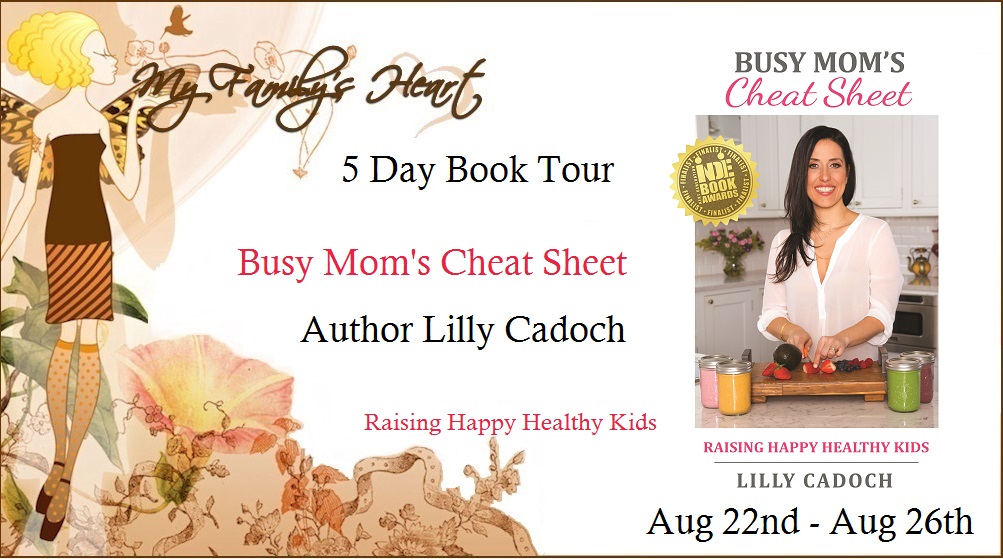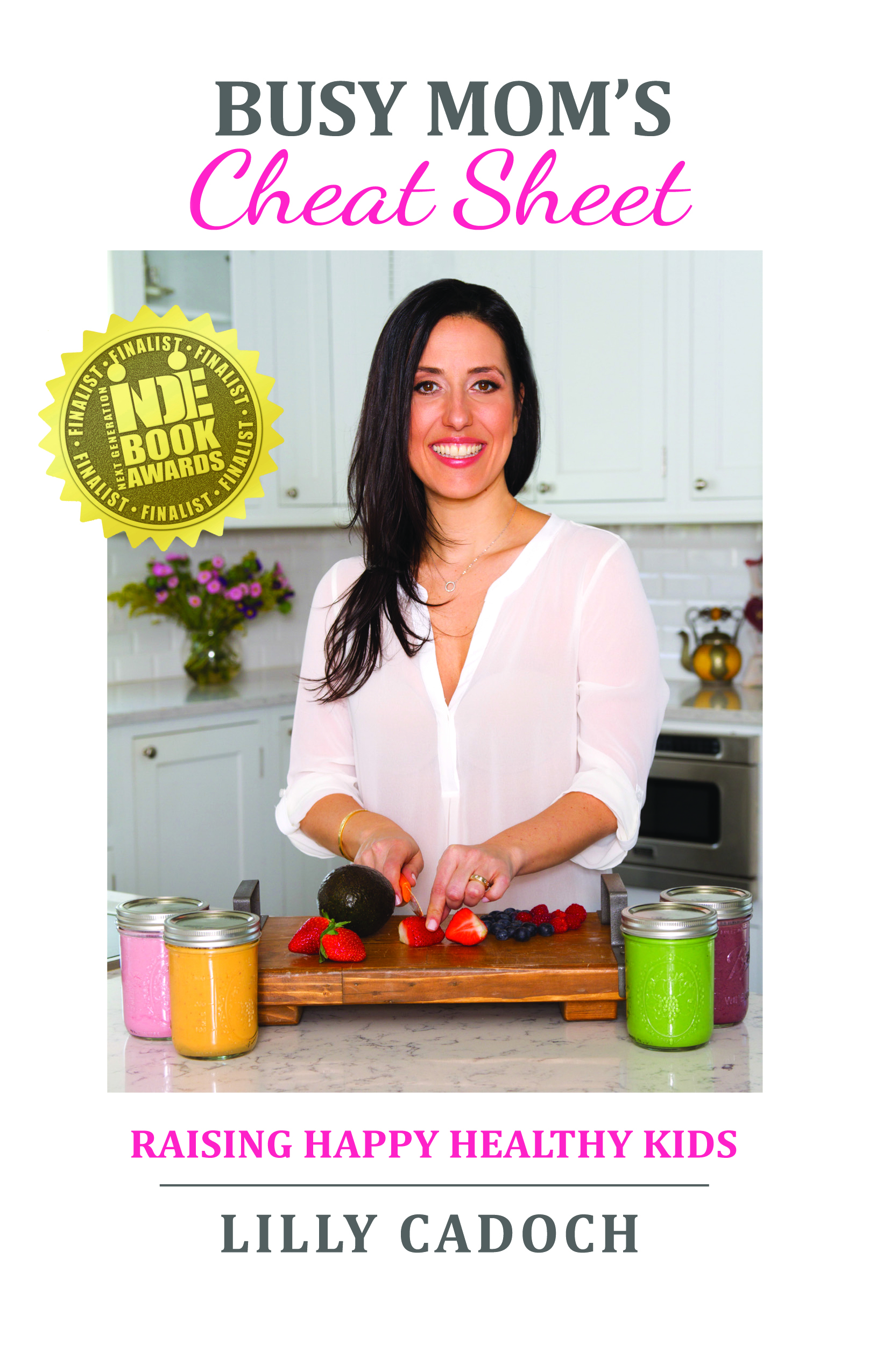
BOOK INFORMATION
TITLE – Busy Mom’s Cheat Sheet
AUTHOR – Lilly Cadoch
GENRE – Parenting Self-Help
PUBLICATION DATE – July 2016
LENGTH (#Pages/# Words) – 153 pages / 31,181 words
PUBLISHER – Picki Beli Publishing
COVER ARTIST – Eli Hershko
Busy Mom’s Cheat Sheet was a finalist at the 2016 Next Generation Indie Book Awards?
BOOK SYNOPSIS

Finally! A book that makes it easy to understand how to feed your kid’s body, mind, and spirit for ultimate health and success.
• Do you have the desire to feed your kids healthy food but don’t know where to begin?
• Are you a modern parent struggling to find balance for your children in a busy lifestyle?
• Do you worry that your kids may not have all the necessary tools to reach their full potential?
Then this book is for you!
In this book you will learn how to teach your children to:
• Make healthier food choices including 18 tips for foods to avoid
• Have a battle-free and enriching bedtime routine
• Integrate regular exercise into your kid’s weekly schedule
• Incorporate time management skills to allow more free time
• Reprogram their mind for success to handle life’s inevitable challenges
Includes 45 bonus recipes that are quick, easy, and delicious!
Lilly Cadoch, certified health coach, award-winning author and mother of two boys, explains in a simple and understandable way, body, mind and spiritual lessons to teach your kids. She learned these lessons the hard way over many years and vowed to change that when she had her children. After witnessing first-hand the tremendous results this has had in her family, she wrote this book to share these lessons with all caregivers and their children. This book is a quick guide aimed at simplifying a lot of information into a very accessible and easy to understand way.
For more information visit BusyMomsCheatSheet.com
BUY & TBR LINKS
AMAZON KINDLE US – AMAZON KINDLE UK
AMAZON KINDLE FR - AMAZON KINDLE IT
AMAZON KINDLE DE - AMAZON KINDLE ES
AMAZON CA - AMAZON PAPERBACK
CREATESPACE - GOODREADS
 EXCERPT
EXCERPT
INTRO
In today’s global economy, more is expected of our kids than ever before. To have a better chance for a successful future, our kids are expected to perform from a very young age. They are taking more standardized tests than we can count, expected to excel at competitive sports, participate in extracurricular activities, all while excelling academically in their coursework. Not only that but college admissions are getting more and more difficult, with no guarantee of getting into the college of choice. As a result, we expect a lot from our kids for them to succeed.
Our goal as parents is to make sure our kids are provided with the optimal conditions in which to succeed. One of our responsibilities is to ensure our kids are eating healthy. This starts with the food we provide them. But our food supply is getting worse every day, which is only working against us. Our kids are eating more processed foods and sugar than ever before, and not enough fruits and vegetables. We live in a country where they count ketchup as a vegetable in the school lunch program and where we are not always told what is in our food supply. According to Food Chemical News, the leading news service on US food law and policy, a U.S. Senate appropriations bill also stipulates that “tomato paste used to make pizzas can be counted toward the weekly total of vegetable servings." The childhood obesity rate is at an all-time high, leading to more cases of childhood diabetes than our medical system is prepared for. It is a very sad fact that this might be the first generation that our kids’ lifespan is expected to be shorter than ours, even by five years.
That is why we need to arm our kids with the physical, emotional and mental tools so that they have a better shot at figuring out their life-path and achieving their goals. A part of arming our kids with this knowledge means that we need to communicate to our children that a healthy life starts with a healthy body. A strong body leads to a strong mind. An open, calm mind helps us discover our life’s purpose. Providing these tools to our loved ones is no easy feat considering we are already very busy caregivers. We have so much going on and adding more items to our ever growing to-do list could be enough to throw us over the edge. That coupled with the fact that the food system isn’t really in our favor and most of the food options out there are not really good for us.
Drinking water is the most important of all lessons and a habit that we want to ingrain into our children’s everyday routine. Water makes up approximately 60% of your body weight. According to H.H. Mitchell, Journal of Biological Chemistry 158, “The brain and heart are composed of 73% water, and the lungs are about 83% water.”[1] Water is involved in every cellular activity in the body, and when you don’t drink enough water, those processes are not as efficient. Some of those processes include metabolism, removing toxins from the body, bringing nutrients to your cells, enabling kidneys to filter properly, etc. Even mild dehydration can drain your energy, make you tired, cause overeating, constipation and prevent weight loss. Another interesting fact about the importance of proper water intake is that most cravings are due to dehydration, so if your child has a craving, first see if it subsides after drinking a glass of water before giving into it.
What exactly does drinking water on a regular basis mean, you ask? While it used to be “drink eight glasses of water per day,” the one-size-fits-all rule, now we are seeing more information that suggests that the amount of water we drink should be more customized to individual needs. A metric to help you gauge the proper amount of water intake is to drink ½ ounce to 1 ounce per pound of your body weight[2]. So if you weigh 100 lbs., then you should be drinking between 50-100 ounces water per day. Be sure to remember that the level of activity, weather, etc. determines where you fit in that range. So if your kids are tired, sluggish and cranky, try giving them a glass of water.
[1] Batmanghelidj, F. Your Body's Many Cries for Water: You Are Not Sick, You Are Thirsty! Don't Treat Thirst with Medications. Falls Church, VA: Global Health Solutions, 1995. Print.
[2] Batmanghelidj, M.D., F. "Frequently Asked Questions." WaterCure. N.p., n.d. Web. 19 Sept. 2015.
If making sure you’re drinking enough water every day wasn't enough of a challenge, another thing to consider is the pH balance of the water you drink. According to Merriam-Webster dictionary, “pH is a number between 0 and 14 that indicates if a chemical is an acid or a base.”[1] pH can either be alkaline or acidic. pH is measured on a scale of 1–14, with 1 being extremely acidic and 14 being highly alkaline. Water should be at least 7.4 pH, which is the same level as your blood or higher for optimum health and hydration. You are probably wondering what does this all mean and why does it matter?
Let me explain: Our bodies work best when our body is alkaline. If it is too acidic, it can cause inflammation, which is a breeding ground for ailments, disease and a variety of health issues. Imagine a fish tank. When a fish tank is clean, water is flowing through the filtration system, the water is clear and fish swim quickly to and fro. As the fish tank gets dirty, the water gets cloudy, algae starts to form on the surface and the fish don’t move as quickly. Eventually, if the tank isn’t cleaned, the fish will ultimately die.
I never realized that the water we drink can have different pH balance levels. This is not typically labeled on the water we drink, so how do we know? Well, you can use a simple and fun water experiment. My kids love putting their scientific hats on and testing different brands of water. I bought pH test drops for water pH. I found pH test drops for water pH with a color chart on Amazon for a pretty reasonable price (approximately $20.00). You need to get the drops, not the strips, to have an accurate reading of water pH, as the strips are used for testing the pH level of urine or saliva. My kids and I added a few drops of it into the different types of water we drank and waited to see which color the water turned. Light green, yellow and orange tinted water are progressively more acidic. Darker green, blue and purple tinted water are progressively more alkaline. I was shocked to see that the store brand water bottles I was sending my kids to school with every day had an acidity level of four!
[1] Merriam-Webster. Merriam-Webster, n.d. Web. 19 Sept. 2015.
AUTHOR BIO
Lilly Cadoch is a certified Integrative Nutrition health coach and award-winning author living in New York with her husband Eli, her two boys Natanel and Itai, and her dog, Angel. She has spent the last few years learning about nutrition and mindful living for both herself and her family while working full time.
Being a very busy working mom, she was determined to find a way to feed her kids healthy and teach them the tools to have a healthy body and mindset so that they could successfully face the ever growing expectations kids face today. She learned these lessons the hard way over many years and vowed to change that when she had her children. After witnessing first-hand the tremendous results this has had in her family, she wrote this book to share these lessons with all caregivers and their children. This award-winning book is a quick guide aimed at simplifying a lot of information into a very accessible and easy to understand way.
Lilly has a passion for food and cooking and loves spending time in the kitchen experimenting with different recipes with her kids. She spends her time educating herself on various different aspects of food and nutrition, creating life memories with her kids, going to spin class with her husband, and playing in her backyard garden.
AUTHOR FOLLOW LINKS
PERISCOPE – BusyMomsCheatSheet
SNAPCHAT – BMCheatSheet
GIVEAWAY PRIZES
2 Free eCopies of books
















